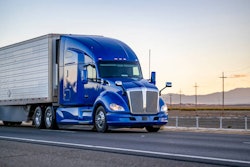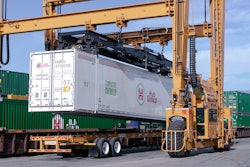Trucking news and briefs for Friday, July 25, 2025:
Quantix renames CLX Logistics following acquisition
Chemical-hauling fleet Quantix, (CCJ Top 250, No. 66) has announced that CLX Logistics and its subsidiaries are now known as Quantix Managed Solutions. The announcement comes one year after Quantix acquired Pennsylvania-based CLX Logistics.
In addition to providing TMS, Benchmarking, Managed Transportation, and Supply Chain Consulting, Quantix Managed Solutions also includes Capacity Solutions, providing outsourced transportation options, specific to the chemical industry.
"The CLX Logistics acquisition has proven to be of great benefit to our customers,” said John Labrie, CEO & President of Quantix. “By leveraging the incredible, chemical-specific data that the team collects, our customers are saving money on everything from fuel costs, transportation costs, and maintenance. Beyond that, we're improving their customer's experience through white-glove delivery."
"Many providers in this space lump the chemical industry into the 'specialty' bucket, but the reality is the challenges they face simply cannot be compared to a car hauler, for example,” said Zack Novak, Senior Vice President & General Manager of Quantix Managed Solutions. “Quantix Managed Solutions offers everything from support for long haul and hazmat to moving bulk shipments with 24-hour notice.”
Quantix Managed Solutions has $24 billion in lifetime freight spend within its Gravity database, all ingested from chemical-specific companies. One-third of that data is from liquid bulk alone.
The rename to Quantix Managed Solutions further solidifies Quantix's commitment to providing and expanding services to the chemical industry.
[Related: Chem company Quantix acquiring CLX Logistics]
House bill would codify worker classification rules into law
A bill making its way through the U.S. House would amend the Fair Labor Standards Act and the National Labor Relations Act to clarify the standard for determining whether an individual is an employee or independent contractor.
The Modern Worker Empowerment Act passed the House Committee on Education and Workforce by a 19-16 vote on Wednesday.
Under the provisions of the bill, an individual would be classified as an independent contractor and not an employer of another person if:
- Such other person does not exercise significant control over the details of the way the work is performed by the individual, without regard to any control the other person may exercise over the final result of the work performed
- While performing such work, the individual has the opportunities and risks inherent with entrepreneurship, such as the discretion to exercise managerial skill, business acumen, or professional judgment
The bill also includes factors that cannot be used in determining a worker’s classification status:
- Whether the prospective employer requires the individual to comply with legal, statutory, or regulatory requirements
- Whether the prospective employer requires the individual to comply with health and safety standards that are more stringent than otherwise applicable health and safety standards
- Whether the prospective employer requires the individual to carry insurance of any kind
- Whether the prospective employer requires the individual to meet contractually agreed-upon performance standards, such as deadlines
According to the Owner-Operator Independent Drivers Association, the second provision could prove problematic for some owner-operators leased to motor carriers. OOIDA felt it could open the door for requirements for use of techs that aren't mandated by law, such as driver-facing cameras, speed limiters and more, jeopardizing "independent truckers’ control over their work," the association noted. The provision "would allow corporate motor carriers to micromanage their operations and rolls back significant progress that small-business truckers have made with the Department of Transportation and President Trump.”
Allowing employers to require more stringent safety standards for contracted workers might result in carriers giving leased owners a “long list of ‘safety’ measures, such as speed limiters, inward-facing cameras, blinker-use monitoring, mandatory monthly remedial training and others that they must comply with” as a condition of the contract, OOIDA added.
With the DOT officially withdrawing the speed limiter proposals of the last decade, OOIDA said this bill “would create a backdoor loophole to force speed limiters on independent truckers anyway -- as long as a megacarrier, and not the independent contractor, says it is good for safety.”
The bill will now move to the full House for a vote and would need to pass there and in the Senate before moving to President Trump’s desk for a signature.
[Related: Speed limiter mandate gets the axe: Proposals officially withdrawn by U.S. DOT]











